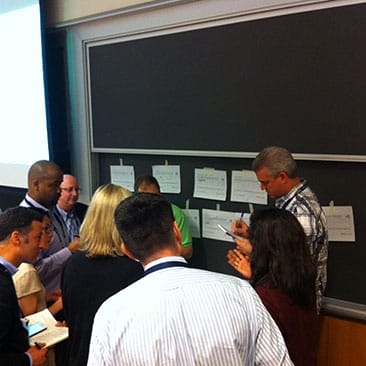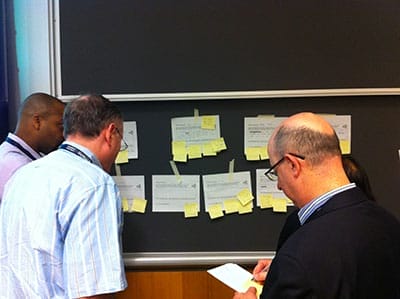Stewart Friedman, practice professor of management at Wharton, believes in the power of open networks. It’s not necessarily whom you know, because most likely those people are all running in your same circles, with similar friends and interests. It’s whom does who you know know, and whom do they know.
Friedman was teaching this lesson in a master class about building social capital to a room full of Reunion attendees. In the very least, he wanted attendees to look around the room and get a sense for the range of secondary contacts of their fellow alumni in the room. Next, he wanted them to consider: How helpful am I? Would an acquaintance want to introduce someone to me? It’s a question that business people, even Wharton people, may not ask themselves honestly and often.
“A lot of this resides below our conscious consideration,” Friedman said, adding that more often than not, individuals help people they consider helpful.
Then he offered tools to cultivate a conscious mindset to increase one’s social capital. The steps, simply put, are as follows:

Step one of Prof. Stew Friedman’s building social capital exercise: Everyone in the group posts a business or personal need to the wall, then explains it to the group.
• Examine your own network as it currently exists.
• Imagine what it would need to look like to achieve your goals.
• Seek out opportunities to help others.
• Discover what others need, then provide it.
• Strengthen your affiliations.
“The engine that drives this is reciprocity,” he said.
To illustrate the power of this give and take, Friedman split the Reunion master class into five groups and asked them to conduct an exercise (which maybe young alumni may feel nostalgic for).
First, each person had to write something they need help with on a worksheet.
They taped these sheets into a cluster on the classroom wall, then each group member spent a few minutes elaborating on their problem. During this time, Friedman stressed, other group members were supposed to focus on listening and thinking: How could I help, or do I know someone who could help?

Step two: Other members of the group offer how they can help solve each other’s needs and problems, writing their offer of assistance on a sticky note.
Finally, everyone had the opportunity to offer this help—by writing down how they could assist on a sticky note and placing it on respective worksheets.
“Just think of the value being created,” Friedman declared over the din of the exercise. “I want to see a sea of yellow sticky notes.”
Friedman is best known for Total Leadership, a method to improve performance in the four domains of life, and for his related teaching and research at the Wharton Work/Life Integration Project.
Now this brings us to how you can help Wharton Magazine. If you were in Friedman’s “Building Social Capital” master class at the 2014 Reunion, let us know what you thought of the exercise and what value you derived. Or, share any other Reunion highlight. Comment below, or send us an email at magazine@wharton.upenn.edu.


























